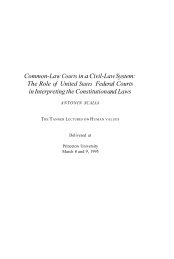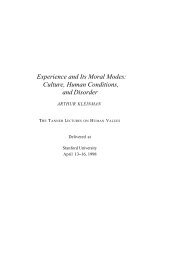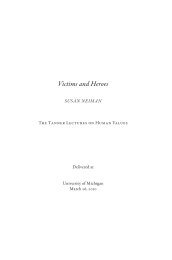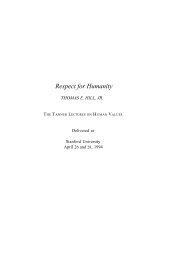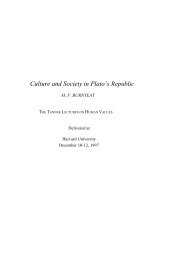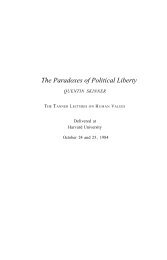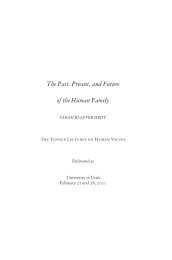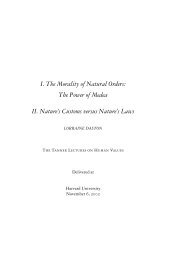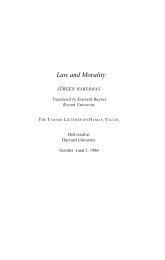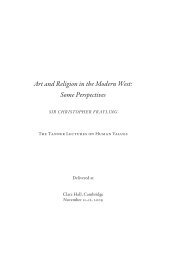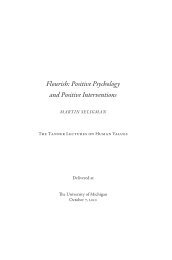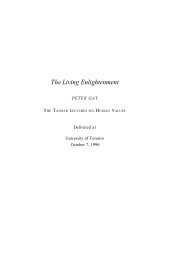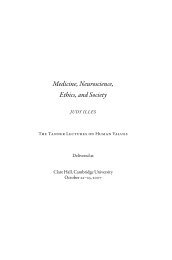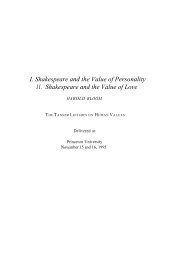Muguerza, Javier - The Tanner Lectures on Human Values
Muguerza, Javier - The Tanner Lectures on Human Values
Muguerza, Javier - The Tanner Lectures on Human Values
You also want an ePaper? Increase the reach of your titles
YUMPU automatically turns print PDFs into web optimized ePapers that Google loves.
[MUGUERZA] <str<strong>on</strong>g>The</str<strong>on</strong>g> Alternative of Dissent 89extralegal grounding of the law, even in the case of human rights.Once incorporated into the legal statutes - for example, in theform of fundamental rights or anything similar - why inquirefurther into their “grounding” or foundati<strong>on</strong>? But, as I said,human rights offered us a Janus face and were moral demandsbefore being recognized as such rights. As moral demands theyc<strong>on</strong>stituted presumed rights - something quite different from supposedrights, where the adjective would serve to disqualify ratherthan just to qualify - or, if <strong>on</strong>e prefers, they might be c<strong>on</strong>sideredassumed rights, that is, demands assumed “as if” they were rights.But how justify our assumpti<strong>on</strong> or presumpti<strong>on</strong> of these rightswithout inquiring into their grounding ? Whatever the positivistmay say, questi<strong>on</strong>s about this grounding are far from idle and wemust c<strong>on</strong>tinue to ask them.But, despite my insistence <strong>on</strong> ethics, I intend that our treatmentof grounding or foundati<strong>on</strong> be as realistic as possible. And,when I speak of realism, I also mean this in the sense of legalrealism, which, as we know, need not be a dirty realism - unlikethe latest United States novels. At least, Judge Oliver WendellHolmes’s scandalous definiti<strong>on</strong>, according to which law is nothingbut the set of “the predicti<strong>on</strong>s about what the judges will do infact,” a definiti<strong>on</strong> that amounted to the birth notice of Americanlegal realism, has never seemed scandalous to me, nor has thecircumscripti<strong>on</strong> of legal validity to the judges’ c<strong>on</strong>duct, which AlfRoss and the Scandinavian realists c<strong>on</strong>tributed to the theorizingabout “law in force,” ever seemed scandalous to me either. 29 Toput it in the briefest terms, it is a questi<strong>on</strong> of recognizing, in c<strong>on</strong>trastto any doctrinaire view of jurisprudence, that judges maysometimes decide - although they will not always, or necessarily,do so-not by virtue of reas<strong>on</strong>s that allow them to adduce anappropriate legal rule for their decisi<strong>on</strong>, but just the reverse, thatis, by first deciding and then choosing - as with a “rati<strong>on</strong>aliza-29 See Dworkin, Taking Rights Seriously, chap. 1, and Liborio Hierro, Elrealismo jurídico escandinavo (Valencia, 1981).



